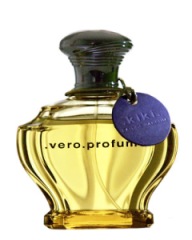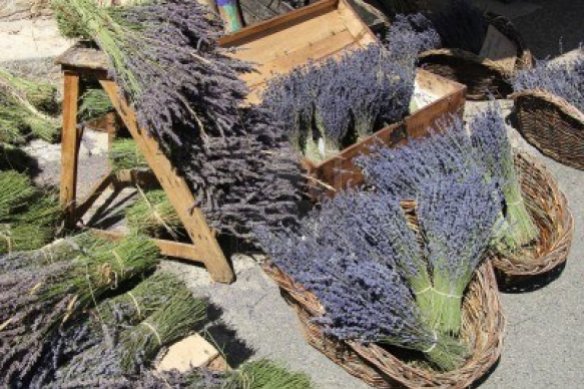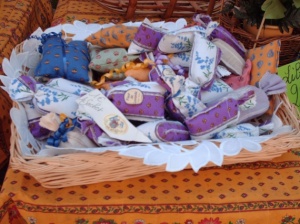As always, my Reviews en Bref are for a fragrance that, for whatever reason, didn’t warrant one of my long, exhaustive, detailed assessments. In this case, it’s Vero Profumo‘s Kiki Eau de Parfum.
Kiki takes me back to my childhood. It returns me to the sun-drenched hills and promenades of Cannes, to the Croisette where we’d sit at Le Festival to have a sandwich, and to the hills where our villa’s long driveway was lined with enormous lavender bushes and mimosa trees. Sun, blue skies, the glitter of turquoise waters, the relaxing heat of a city made fragrant by the flowers that surrounded you everywhere — those are all parts of my childhood summers in Cannes, a city that is just a 15-minute car ride from Grasse whose famous floral fields have made it the perfume-making center of the world.
Unfortunately, not all aspects of that trip down memory lane are pleasant. My time in Cannes created a strong backlash against lavender that, at times, seemed to besiege me from every nook, cranny, drawer, cupboard, kitchen, restaurant, boutique, promenade, street, house, garden, market, and every other possible, conceivable location imaginable. It was well-nigh unbearable to someone with a sensitive nose, and it left a definite mark. Since that time, I cannot stand lavender unless it’s done really well and is not abrasive. That’s not the case for Kiki, a fragrance whose opening I briefly struggled with before it turned into a plain, pretty, banal blur.
Vero Profumo (sometimes written with odd punctuation as “.vero.profumo.“) is a Swiss niche perfume line that was established in 2007 with three pure parfums called Onda, Kiki, and Rubj. Kiki in Eau de Parfum form came along three years later, in 2010, and the new concentration had a new formula and notes to go along with it. This time, there was passion fruit — which is probably why Fragrantica puts Kiki in the “aromatic fruity” category. Luckyscent provides the full list of notes:
Lavender essential oil, bergamot, citron, passion fruit, lavender absolute, geranium, caramel, patchouli, musk.
Kiki Eau de Parfum opens on my skin with a sonic boom of sharp, pungent, herbal, almost medicinal, dried lavender. In less than a minute, however, it is infused by a strange, intense sweetness that just barely hints at being caramel. The bitter, harsh dried lavender of the sachets that plagued my childhood summers — the exact type of lavender I despise the most — is on full show here. It continues unabated for a few minutes until suddenly, drastically and quite dramatically, it starts to soften. It’s now slightly gentler, warmer, sweeter, rounder, and subtly flecked by a tart, tangy fruitness and by the merest floral whisper from the geranium.
The fruit notes are interesting. Fresh citruses are mixed into the tart, tangy, sweet, and slightly musky character of the passion fruit. Quickly, they start to infuse the lavender, creating a potent bouquet of bracing, sharp, pungently dry, forceful, but sweetly fragrant lavender with tart, sensuously musky passion fruit and general sweetness. The caramel, patchouli, and subtle, slightly spicy, floral tones of the geranium work in the background, having an indirect effect but never being forcefully noticeable in their own right. It underscores how well-blended Vero Profumo fragrances always are, but it also marks the beginning of something that becomes problematic later on: blurriness. We’ll get to that later.
Ten minutes into Kiki’s development, the only distinctive, individual notes are passion fruit and lavender ensconced in an amorphous, airy sweetness. It never feels as though there is full-on caramel in Kiki; there is nothing at all like the rich, heavy, unctuous gooeyiness of the caramel you find in desserts. Actually, it rather feels as though the caramel is infused with vanilla, whipped into a frothy, bubbly, foam-like airiness. It’s extremely pretty, but very subtle. So subtle that it fails to ever fully tame the forceful pungency of that lavender. Even with the sweet notes that infuse it, the lavender is still too much like those Grasse dried sachets of my nightmares with their sharp, abrasive, aggressive, herbal blasts that assault everything they touch. (Maybe I need therapy for my feelings of hostility towards the poor plant?)
Kiki continues its bilateral focus for a while longer. At the twenty-minute mark, the perfume is bracing lavender, soft lavender, sweetened lavender, and fruity lavender, lightly infused with sweet musk and sweetness. If my words sound repetitive and redundant, it’s because they’re meant to be. Kiki is primarily and predominantly one singular theme with only minor, subtle variations. In the background, hints of citruses twinkle like dainty, tiny lights one sees in distant hills. Soft patchouli darts around like a firefly. A very pretty, plush, warn, snuggly softness stirs at the base, feeling as cozy as a cashmere throw. The whole thing is subsumed into a very powerful, potent, forceful combination that is, simultaneously, very airy and very lightweight in feel. Objectively, it’s very pretty; intellectually, I can’t find any of it to be very complex or interesting.
Less than an hour into Kiki’s development, it all starts to turn a little hazy. The perfume’s texture feels creamy, soft, and smooth, but the notes are increasingly blurry. There are a lot of very well-blended perfumes where the elements don’t feel quite so nebulous, intangible, abstract and amorphous. At least, not quite so soon. Kiki has turned into an almost hazy blur of soft, sweet, musky floralness that just barely hints at lavender. Once in a blue moon, the vanillic caramel pops up like a ghost to feel a little more concrete, but it is incredibly fleeting. There is a sweet musk, presumably from the passion fruit, but it has no concrete basis. Even the hint of lavender feels like a flittering, darting thing that you’re trying to grab onto, but it keeps slipping away. It’s an exercise in frustration to pin anything down beyond the general, abstract, creamy, floral sweetness. Even Casper the Friendly Ghost has more structure to his shape and form.
That’s all there is to Kiki on my skin. For the next few hours, its mellow, creamy, floral sweetness darts about like a will o’ the wisp, becoming closer and closer to the skin. It’s a pretty smell, but it’s nothing more than that. The word “boring” actually comes to mind. Exactly 3.75 minutes into the perfume’s development, Kiki is nothing more than sweet, musky vanilla on my skin. It lingers on, soft as a gauzy whisper, for another few hours, then dies completely just over the 6.75 hour mark.
Some of you may think that I can’t objectively and fairly judge a perfume that is centered around a note I dislike so much. You may have a point. However, if reviewers only focused on things they knew they would like, then every magazine, newspaper or website would have to hire thousands of sub-specialists. That’s simply not reality. Perfume reviewing is, by its very nature, even more subjective than most fields, but that doesn’t mean my issues with a particular note automatically doom a fragrance. I loathe ISO E Super, but I’ve given good reviews for a number of fragrances with the dreaded note. I am not a passionate iris fan, but that hasn’t stopped me from loving a few perfumes built around it, either. And, regular readers will know that I have very much appreciated a couple of fragrances which showcased lavender. I gave enormous praise to Histoires de Parfums‘ 1725 Casanova, a lavender aromatic fougère which just barely straddles the gourmand category with its vanilla. It’s lovely enough that I’ve actually considered wearing it. I also greatly admired and liked Santa Maria Novella‘s Ambra which has lavender with neroli and birch tar. And I’ve adored a number of fragrances that have clary sage, a lavender-like plant, or which have featured lavender in conjunction with other notes. So, I don’t hate all perfumes with lavender, but they have to be really good ones to get over my lack of enthusiasm for the note.
At the end of the day, Kiki simply isn’t all that special in my opinion. What manifested itself on my skin was pretty, yes, but it’s neither interesting nor complex. I think the whole thing actually verges on the plain and banal. And that is a far greater problem to me than a brief twenty-minute struggle with the lavender at the beginning. So, Kiki is a complete pass. I’ll stick to Vero Profumo’s honey-vetiver chypre, Onda, whose complexities, nuances, range, and beauty made my jaw drop. It’s a brilliant fragrance that has my heartiest admiration, intellectually and emotionally. Kiki does not.




